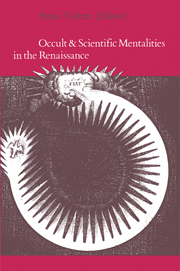Book contents
- Frontmatter
- Contents
- List of contributors
- Editor's preface
- Introduction
- 1 At the crossroads of magic and science: John Dee's Archemastrie
- 2 The occult tradition in the English universities of the Renaissance: a reassessment
- 3 Analogy versus identity: the rejection of occult symbolism, 1580–1680
- 4 Marin Mersenne: Renaissance naturalism and Renaissance magic
- 5 Nature, art, and psyche: Jung, Pauli, and the Kepler–Fludd polemic
- 6 The interpretation of natural signs: Cardano's De subtilitate versus Scaliger's Exercitationes
- 7 Kepler's attitude toward astrology and mysticism
- 8 Kepler's rejection of numerology
- 9 Francis Bacon's biological ideas: a new manuscript source
- 10 Newton and alchemy
- 11 Witchcraft and popular mentality in Lorraine, 1580–1630
- 12 The scientific status of demonology
- 13 “Reason,” “right reason,” and “revelation” in midseventeenth-century England
- Index
3 - Analogy versus identity: the rejection of occult symbolism, 1580–1680
Published online by Cambridge University Press: 12 January 2010
- Frontmatter
- Contents
- List of contributors
- Editor's preface
- Introduction
- 1 At the crossroads of magic and science: John Dee's Archemastrie
- 2 The occult tradition in the English universities of the Renaissance: a reassessment
- 3 Analogy versus identity: the rejection of occult symbolism, 1580–1680
- 4 Marin Mersenne: Renaissance naturalism and Renaissance magic
- 5 Nature, art, and psyche: Jung, Pauli, and the Kepler–Fludd polemic
- 6 The interpretation of natural signs: Cardano's De subtilitate versus Scaliger's Exercitationes
- 7 Kepler's attitude toward astrology and mysticism
- 8 Kepler's rejection of numerology
- 9 Francis Bacon's biological ideas: a new manuscript source
- 10 Newton and alchemy
- 11 Witchcraft and popular mentality in Lorraine, 1580–1630
- 12 The scientific status of demonology
- 13 “Reason,” “right reason,” and “revelation” in midseventeenth-century England
- Index
Summary
It is my contention that the occult and the experimental scientific traditions can be differentiated in several ways: in terms of goals, methods, and assumptions. I do not maintain that they were exclusive opposites or that a Renaissance scientist's allegiance can be settled on an either/or, or yes/no, basis. Rather, in many instances, especially in the late sixteenth and seventeenth centuries, a spectrum of beliefs and attitudes can be distinguished, a continuum from, say, absolutely magical to absolutely mechanistic poles, along which thinkers place themselves at various points depending on their attitudes to certain key topics. One of these topics, not much discussed so far, is the relationship between language and reality. In the scientific tradition, I hold, a clear distinction is made between words and things and between literal and metaphorical language. The occult tradition does not recognize this distinction: Words are treated as if they are equivalent to things and can be substituted for them. Manipulate the one and you manipulate the other. Analogies, instead of being, as they are in the scientific tradition, explanatory devices subordinate to argument and proof, or heuristic tools to make models that can be tested, corrected, and abandoned if necessary, are, instead, modes of conceiving relationships in the universe that reify, rigidify, and ultimately come to dominate thought. One no longer uses analogies: One is used by them. They become the only way in which one can think or experience the world.
- Type
- Chapter
- Information
- Occult Scientific Mentalities , pp. 95 - 164Publisher: Cambridge University PressPrint publication year: 1984
- 32
- Cited by



